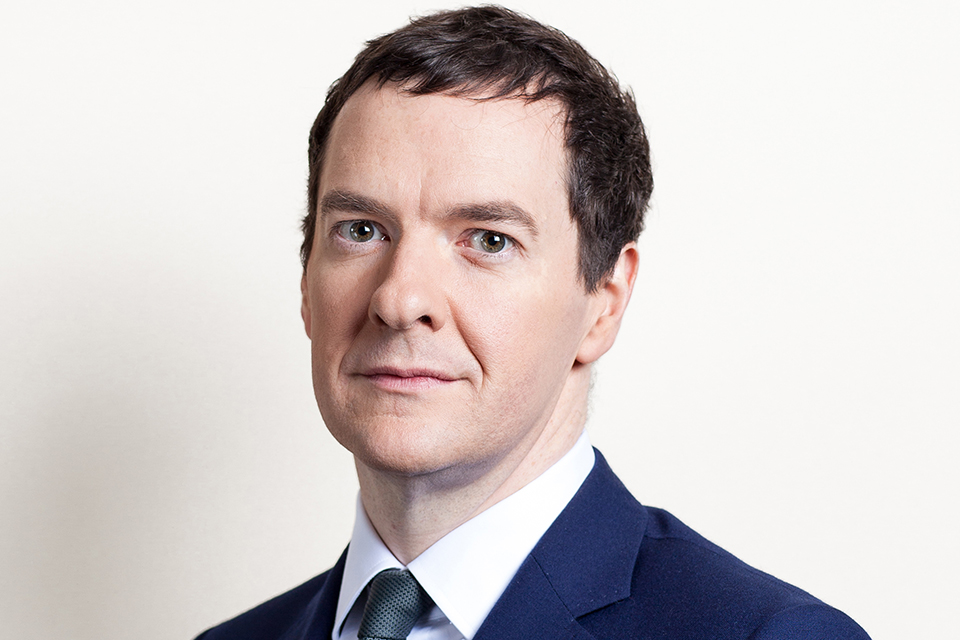IMF Article IV 2015 concluding statement: remarks by the Chancellor of the Exchequer
Chancellor's statement at the conclusion of the IMF's 2015 Article IV assessment of the UK.

Welcome to Christine Lagarde and her team, ably led by Mission Chief Philip Gerson, back to the Treasury and to the UK.
As those who follow these things will know, the Article IV is the annual assessment of a country’s economy by the IMF.
But, due to the timing of our general election, the IMF postponed the assessment until later in the year. So it’s been a full 18 months since the IMF were here last.
In that time, a lot has changed in the global economy.
Risks from elsewhere in the world are rising.
Many emerging economies are struggling with dramatic changes in commodity prices. The US is weighing up the most anticipated monetary policy decision in living memory. And China is going through challenging but necessary reforms.
It is therefore no surprise that the IMF recently downgraded their forecast for 2015 global growth to 3.1%, making it the slowest year of growth since 2009 – the height of the crisis.
And so in a world where the risks are increasing, not decreasing, it remains of the utmost importance that we go on working through our plan to build our resilience and better prepare Britain for whatever lies ahead.
Today’s IMF report frankly, could hardly be more positive.
It says that UK growth has exceeded that of the other major advanced economies; unemployment has fallen substantially, employment has reached an historic high, the deficit has been reduced and financial sector resilience has increased.
The IMF rightly identify three key challenges for the British economy.
It is their job to identify risks, and our job to respond to them.
I’m glad to say all three challenges are ones we are already addressing.
The first is productivity. Output per hour is still 15% here below its pre-crisis trend, and French, German and American workers produce almost a third more per hour than their British counterparts.
This is a historic challenge for the UK.
We must increase the productivity of our economy if we are to deliver the sustained increases in living standards we want to see.
In a knowledge-based economy like ours, productivity gains rely on the skill and ability of our workforce.
That’s why we’re pushing ahead with our new apprenticeship levy, driving up standards in our schools, and increasing access to our universities so more students can benefit from our world class higher education system
The second challenge is also a long familiar one to observers of the British economy: housing. The British economy has in the past been vulnerable to shocks within the housing market.
That’s precisely why we created the Financial Policy Committee in the Bank of England– so they can look across our financial sector, identify asset bubbles and take action to prevent them.
I welcome that the IMF recognise the early endeavours of the Financial Policy Committee have been successful, but the long term answer to the British housing dilemma is to build more homes.
So that’s exactly what we’re going to do. I’ve just announced we’re doubling the housing budget, and embarking on the biggest home-building programme by any British government since the 1970s.
The third key risk is the deficit.
We know that – and that’s why reducing the deficit has been so central to our plan.
In 2010 the deficit we inherited was set to be 11.1% of national income – a peacetime record.
This year it is set to fall to almost a third of that – 3.9%.
But at over £70 billion this year, borrowing is still far too high. Alongside a large current account deficit, we currently have the second largest fiscal deficit in the G7 as a share of national income.
Thanks to the spending plans I have set out in the recent Spending Review, that deficit falls every year, so does debt and we are set to reach a surplus.
The IMF are explicit today: this pace of deficit reduction is appropriate and I very much welcome their evaluation.
This appropriate deficit reduction plan is based on the simple rules set out in our new Charter for Budget Responsibility to have debt falling, reach a surplus and to keep that surplus in normal times.
Today, the IMF say our surplus rule is simple and transparent and has flexibility.
It’s a very important moment, and helps build consensus for our plan.
Let me conclude by saying this.
Over the years I’ve been attending this Article IV press conference, it has sometimes been controversial, as people pointed to the differences between our plan and the IMF’s advice.
Today the IMF could not be clearer. They say that our economy is stronger, more resilient and has more jobs.
The IMF believe our approach to fixing the public finances is appropriate and transparent.
This is the strongest IMF assessment of the British economy in the 5 years I’ve been doing this job.
Yes, there are still risks. The IMF have identified the risks, and they are the same risks we’ve identified and are taking action to prevent.
I take this as an endorsement of our plan to fix the roof while the sun is shining
Now I’d like to hand over to Christine [Lagarde], who will set out the IMF’s findings in more detail and then take your questions.